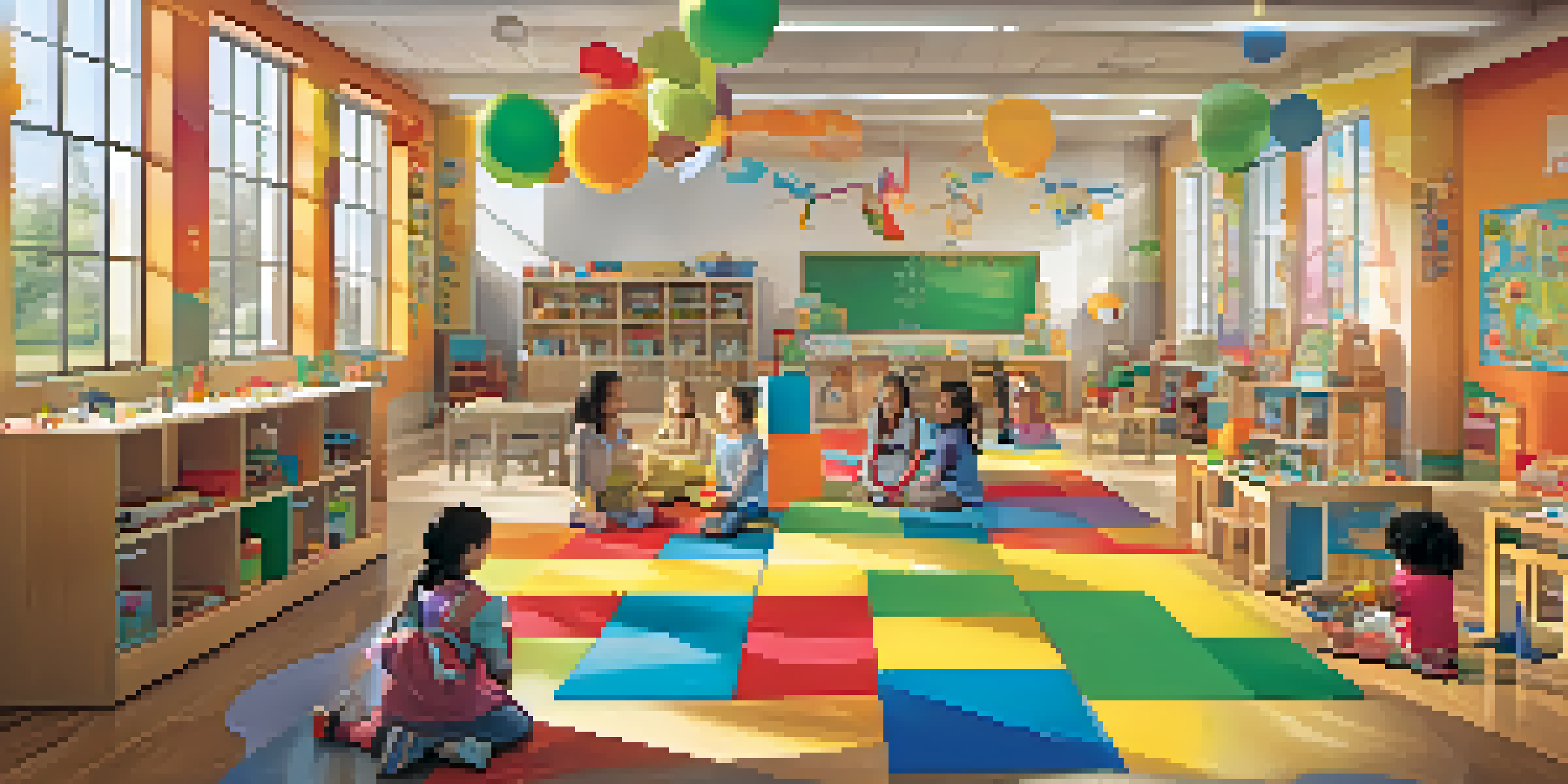Exploring Theoretical Foundations of Learning Through Play

Understanding Learning Through Play: An Overview
Learning through play is a concept that emphasizes the importance of play in the educational process. It suggests that play is not just a leisure activity but a critical component of learning. By engaging in play, children can explore, experiment, and express themselves, which enhances their cognitive and social skills.
Play is the highest form of research.
This approach aligns with various educational theories, including Piaget's stages of cognitive development, which highlight how children learn through active engagement with their environment. The idea is that play fosters curiosity and creativity, allowing children to make sense of the world around them.
Moreover, learning through play encourages a joyful learning atmosphere, making education more enjoyable and effective. When children are allowed to learn through play, they are more likely to retain information and develop a lifelong love for learning.
The Historical Context of Play in Education
The concept of learning through play isn't new; it has roots in educational philosophies dating back centuries. Figures such as Friedrich Froebel, the founder of kindergarten, emphasized the significance of play in early childhood education. He believed that play is a child's 'work' and essential for holistic development.

Over the years, various educational theorists, including Maria Montessori and Lev Vygotsky, have expanded on this idea, highlighting the social and cultural aspects of play. Vygotsky, for instance, introduced the concept of the Zone of Proximal Development, which underscores how play can help children learn with guidance from peers or adults.
Play Enhances Learning and Development
Learning through play fosters cognitive, social, and emotional skills, making education more effective and enjoyable.
This historical perspective showcases how play has continually been recognized as a vital tool in education. It reflects a collective understanding that play is not merely a break from learning but an integral part of it.
Key Theoretical Frameworks Supporting Play-Based Learning
Several theoretical frameworks underscore the significance of play in learning. Constructivism, for instance, posits that knowledge is constructed through experiences, and play provides a rich context for these experiences. Children build understanding through exploration, making connections between new knowledge and what they already know.
Through play, children learn to understand the world around them.
Another relevant framework is experiential learning, which emphasizes learning through experience. Play acts as a medium for experiential learning, allowing children to engage with concepts actively and reflect on their experiences, leading to deeper understanding.
Additionally, social learning theory highlights the role of observation and imitation in learning. In play, children often mimic behaviors and language, facilitating social interactions that enhance their learning. These frameworks collectively reinforce the idea that play is a powerful vehicle for learning.
Cognitive Benefits of Learning Through Play
Engaging in play significantly boosts cognitive development in children. Through play, children develop critical thinking and problem-solving skills as they navigate various scenarios and challenges. For instance, building blocks can enhance spatial reasoning and creativity.
Moreover, play stimulates language development. When children engage in pretend play or role-playing, they often expand their vocabulary and improve their communication skills. This social interaction is crucial for language acquisition and overall cognitive growth.
Historical Roots of Play in Education
The concept of learning through play is grounded in educational philosophies from figures like Froebel, Montessori, and Vygotsky.
Research has shown that children who engage in play-based learning tend to perform better academically. This correlation highlights the importance of integrating play into educational settings, as it can lead to improved learning outcomes and a more profound understanding of complex concepts.
Social and Emotional Learning Through Play
Play is not only vital for cognitive development; it also plays a crucial role in social and emotional learning. Through play, children learn to navigate social situations, develop empathy, and build friendships. For example, cooperative games teach teamwork and communication skills.
Additionally, play allows children to express their emotions and understand the feelings of others. Engaging in role-play scenarios helps them practice empathy and emotional regulation, which are essential skills for interpersonal relationships.
This social aspect of play fosters a sense of belonging and community among children. When they engage in group play, they learn to work together, resolve conflicts, and appreciate diverse perspectives, laying the foundation for healthy social interactions.
Challenges in Implementing Play-Based Learning
Despite its benefits, implementing play-based learning in educational settings can be challenging. One significant barrier is the traditional education system, which often emphasizes standardized testing and rigid curricula. This structure can clash with the flexible nature of play-based approaches.
Moreover, some educators may feel unprepared or lack the necessary training to facilitate play effectively. Without proper guidance, play can become unstructured or chaotic, leading to missed learning opportunities. Training and professional development for educators are crucial in addressing this issue.
Challenges in Play-Based Learning
Despite its benefits, play-based learning faces challenges such as traditional education models and the need for better educator training.
Additionally, there can be misconceptions about play being 'less serious' than traditional learning methods. It's essential to shift this mindset and recognize play as a legitimate and valuable way to enhance learning outcomes.
Future Directions for Learning Through Play
Looking ahead, there's a growing recognition of the importance of play in education. As research continues to highlight its benefits, more schools are beginning to incorporate play-based learning into their curricula. This shift reflects a broader understanding of child development and the need for holistic educational approaches.
Additionally, technology can play a role in enhancing play-based learning. Interactive games and educational apps can provide new avenues for exploration and creativity, making learning more engaging for children. However, it's essential to balance screen time with physical play to ensure well-rounded development.

Ultimately, the future of learning through play lies in collaboration among educators, parents, and communities. By working together to create supportive environments that prioritize play, we can help foster a generation of curious, creative, and capable learners.